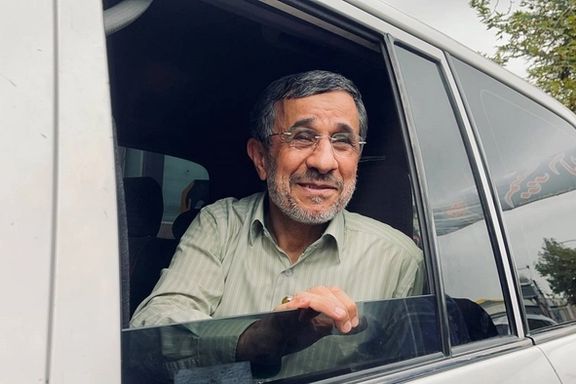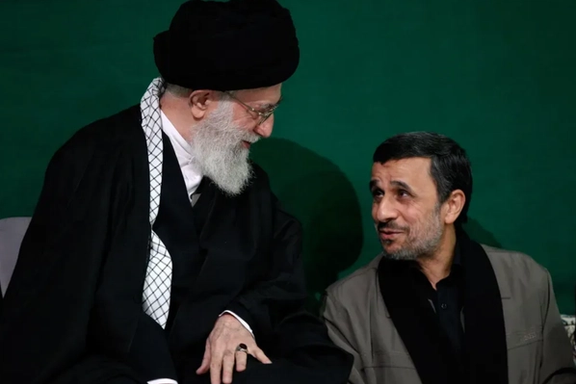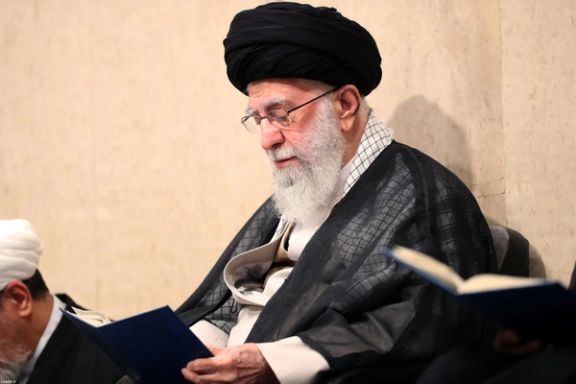Iran's Ahmadinejad Considers Presidential Run

Former President Mahmoud Ahmadinejad announced that he is considering entering the upcoming presidential elections following the recent death of Iranian President Ebrahim Raisi.

Former President Mahmoud Ahmadinejad announced that he is considering entering the upcoming presidential elections following the recent death of Iranian President Ebrahim Raisi.
Dolat Bahar Telegram channel, run by Ahmadinejad supporters, posted a video of him on Saturday addressing his fans and saying that he’s confident “the situation is changing for the better.”
“There are rapid changes taking place, not just in Iran but in the world, and I am hopeful that we will soon see the sweet changes,” Ahmadinejad said.
A new president will be elected on June 28th following the death of Ebrahim Raisi and his delegation in a helicopter crash last weekend.
Ahmadinejad supporters in the parliament have already welcomed his possible candidacy, claiming he’s “one of the most popular political figures in the country.”
Speaking to ILNA, Ahmad Alireza Beigi, a representative of Tabriz in the parliament, said, "If Mahmoud Ahmadinejad runs for president, he will win."
He also warned about the consequences of Ahmadinejad's disqualification without going into further detail. He was barred from running in the 2017 and 2021 presidential elections by the Guardian Council largely controlled by Supreme Leader Ali Khamenei.

"Ahmadinejad must be assured that the Guardian Council will approve him for candidacy because if he signs up and is disqualified, it will have dire consequences," Alireza Beigi added.
After the former president was denied the chance to run in the 2017 elections, he became an outspoken critic of the system, even openly criticizing Mr. Khamenei. He has been walking a tightrope in the past two years and remaining mostly silent to avoid a backlash by loyalists close to the Supreme Leader.
Candidates seeking to run for the presidency, parliament, and the Assembly of Experts, which appoints Ali Khamenei's successor, must be approved by the Guardian Council, the constitutional election watchdog.
After Raisi's death, the Islamic Republic leader faces the challenge of re-engaging an electorate deeply disillusioned by recent elections. At the same time, efforts are being made to ensure that hardliners maintain control over the now largely ceremonial presidency, as state institutions undergo a purge to be filled entirely with Khamenei’s loyalists.
According to official statistics, 40.6 percent of eligible voters participated in the first round of the recent parliamentary elections. In Tehran, 24 percent of the population voted, the lowest in any election in the Islamic Republic's history.
Even lower turnout was recorded in the run-off elections earlier this month. In Tehran, where only seven percent of eligible voters cast their ballots.

On Saturday, Elias Hazrati, the managing editor of Tehran’s leading reformist daily Etemad, pointed out that holding elections with low participation “is a disaster for any country and a more severe one for the Islamic Republic” since the vote of the people is used to validate the legitimacy of the system.
In regards to the elections, Iran analyst and journalist Morad Vaisi believes the Islamic Republic is about to enter its third phase.
“The first phase was about the left versus the religious right; the second phase was reformists against fundamentalists. The third phase involves military and security personnel,” Vaisi told Iran International.
“In the upcoming elections, we will not see any other faction members running; it will probably be someone among the military and security figures,” he added.
While many consider the Iranian presidency to be more of a symbolic post, with significant decisions made in Khamenei's headquarters, the eyes are on him to see what lies ahead in the country's political landscape.
Some also took the fact that the last three presidents—Hassan Rouhani, Mahmoud Ahmadinejad, and Mohammad Khatami—were not present at Raisi’s funeral on May 22, to be a symbolic gesture signaling the presidency's ever-eroding position since it was taken that they were not invited to the ceremony.
Additionally, Khamenei's apparent car-free attitude toward Raisi's death after the news broke about his helicopter crash and disregard for his role in the country were other indications of the disregard of the administration.